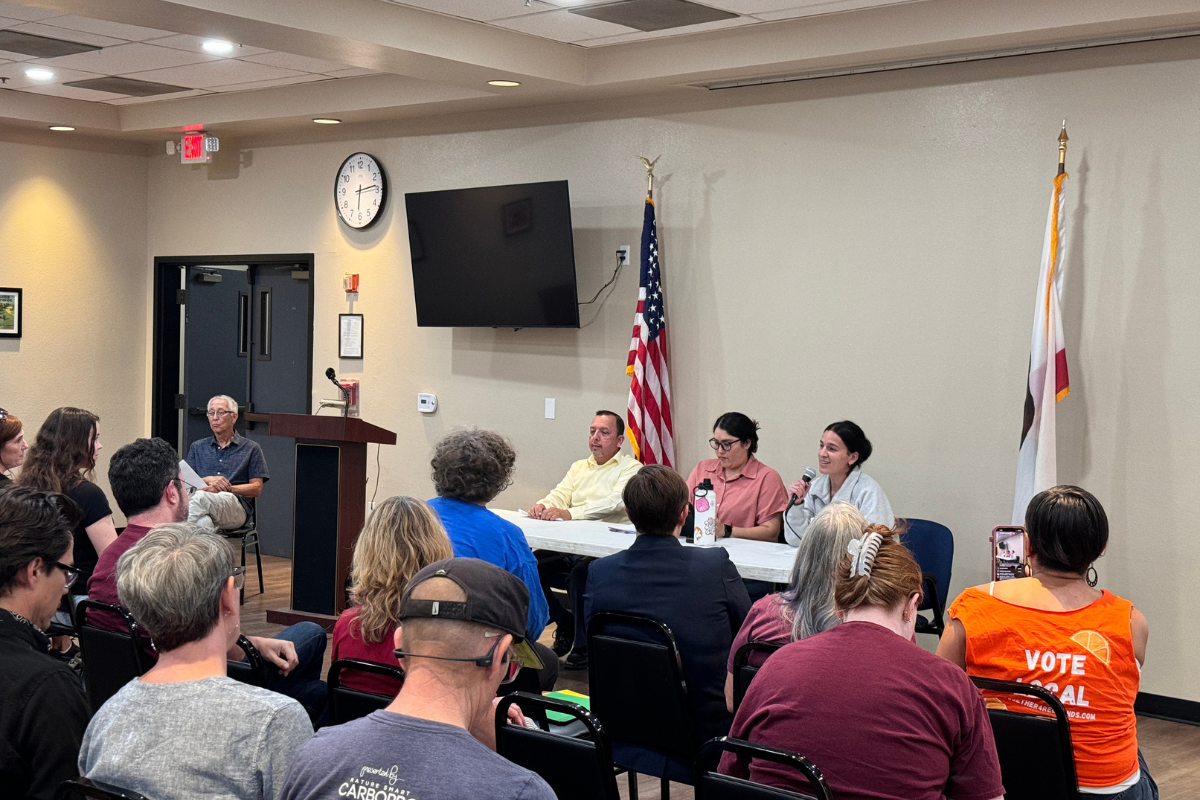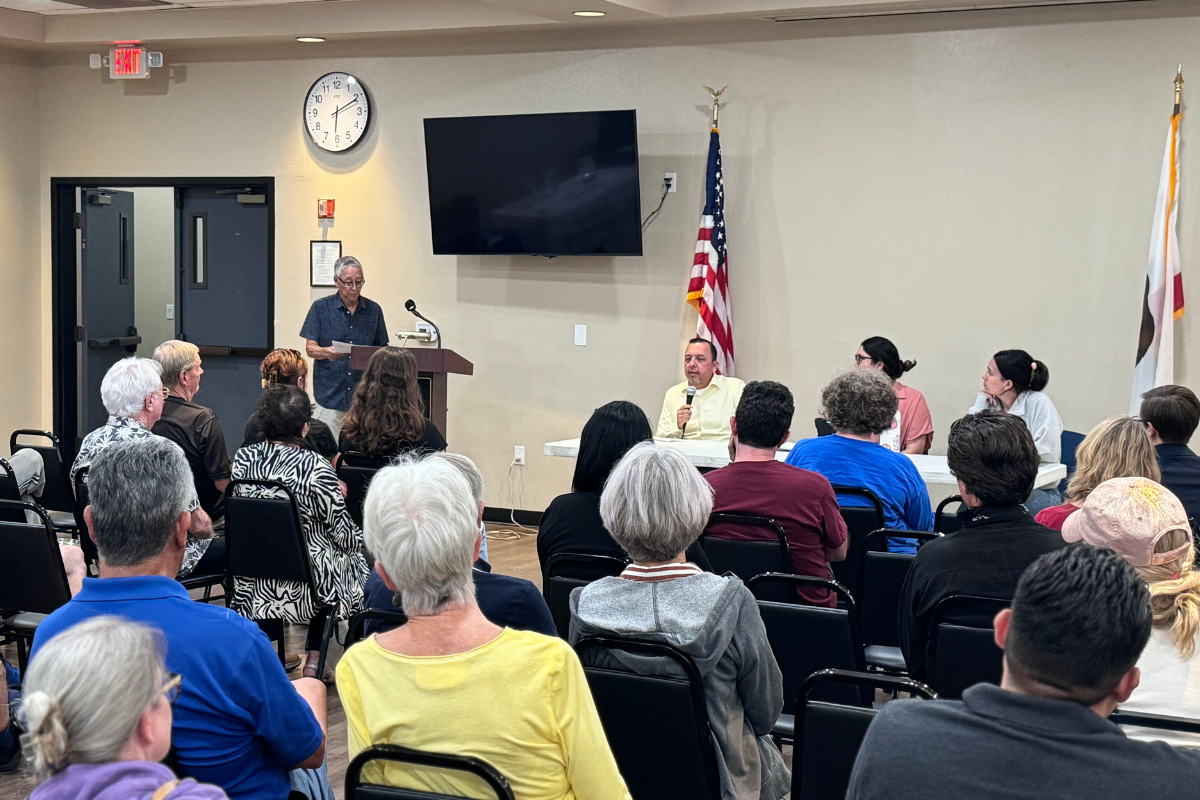New Year's Eve Orange Drop returns to downtown Redlands
Free downtown event offers music, kids activities and a 9 p.m. countdown for all ages
Candidates agree on electrification, walkability, but differ over warehousing pressure

REDLANDS, Calif. — Candidates for Redlands City Council discussed their views on climate change and environmental policies during a recent forum, focusing on development, public transportation, electrification, and water conservation efforts for the city.
Why it matters: Redlands experiences the worst ozone air quality in the county, according to Southern California Air Resources Board data. In addition to current air quality challenges, climate data predicts the city will face more extreme heat days by mid-century, exacerbating ozone pollution.
Details: Accelerate Neighborhood Climate Action (ANCA) and Citizens Climate Lobby (CCL) sponsored the event.
Three of the five declared candidates for Redlands City Council participated: Eddie Tejeda and Jennifer Maravillas from District 2, and Jenna Guzman-Lowery from District 4.
About 70 people gathered at the Redlands Community Center on Wednesday, Sept. 25 to hear the candidates present their visions for addressing climate-related issues.
Keith Osajima, who moderated the forum, was encouraged by the turnout.
"I am really pleased with the event. The turnout speaks to the interest people have in the issue," Osajima said.
University of Redlands Students for Environmental Action were also present at the event.
Sienna Hepworth, a senior studying Environmental Science and GIS, said she's passionate about preserving nature and fighting climate change.
"We want to bring awareness about climate issues, especially of air quality, because we might not be as productive as we think."
Redlands resident Loring Fisk-Phillips, who attended the event with his wife, echoed the sentiment.
"We have a big interest in the environment, and a lot of that can be influenced locally," Fisk-Phillips said. "These are the people that can make a difference, so we wanted to find out where they stand to help inform our vote."
Key Issues: Topics discussed included development strategy, emissions reduction, public transportation, water conservation, and local food sources.
The forum began with a focus on the city's 2035 General Plan and sustainable development as Redlands meets state-mandated housing goals.
Candidates supported development that includes affordable housing, walkability, biking infrastructure, and increasing the tree canopy.
Guzman-Lowery stressed the need to change zoning policies to allow for more infill housing and medium-density developments like townhomes, duplexes, and triplexes.

"No more urban sprawl, none, zero," Guzman-Lowery said. "More green spaces, prioritizing structures like trees, parks, and native plant areas. We need urban infill and strategic increases in density."
Tejeda pointed to the city's inclusionary housing ordinance, which encourages developers to build affordable units, as a positive step. He also mentioned that the city is awaiting a new development, which will include very-low-income housing.
Maravillas advocated for streamlining the process of building accessory dwelling units (ADUs) in North Redlands, where many homes have large lots. She also stressed the importance of infrastructure development in supporting the transition to electric vehicles.
"We need to be proactive about the next 10 years and start planning the necessary infrastructure now," she said.
When the conversation shifted to warehousing, both Guzman-Lowery and Maravillas expressed opposition to additional warehouse development in the city.
Tejeda, one of the three council members who voted in favor of a recent 200,000-square-foot warehouse development, acknowledged the community's disappointment but defended his vote and said it was based on "legal obligations."
He said the council members should act like "judges," evaluating whether the project meets development standards rather than letting personal opinions or public opposition influence their decisions.
"The public sentiment is different," Tejeda said. "There's no requirement in the deliberation process to take it into consideration."
Guzman-Lowery, who voted against the warehouse, cited the Planning Commission's unanimous recommendation to reject the project and concerns about air pollution in the Inland Empire. She stressed the importance of aligning with community values and standing against potential environmental harm, even at the risk of litigation.
Maravillas said she would have voted against the project, criticizing developers for dismissing community concerns. She said that the city should prioritize its residents' voices over developers.
In an unplanned rebuttal, Tejeda reiterated his stance that his colleagues presented no legal grounds to reject the project.
The candidates discussed the city's role in reducing carbon emissions, with the electrification of city vehicles and buildings being a key focus.
Guzman-Lowery suggested following the example of cities like Lancaster and Sonoma, which have adopted community choice energy programs and transitioned to clean energy. She advocated for policies focusing on alternative energy sources to reduce emissions.
Tejeda highlighted existing programs like LEED certification, which promotes energy-efficient building practices. He noted the city's ongoing efforts to convert its vehicle fleet to electric but stressed the need for grants to fund further electrification, as the city's budget is already committed to other programs.

Maravillas emphasized the need for more charging stations and tailored infrastructure to meet the needs of North and South Redlands.
"The key is identifying grants and funding sources to alleviate the costs of electrification," she said.
Tejeda also noted the city's efforts to implement food waste programs as part of reducing emissions, adding, "They're doing the best they can with the available funding."
He mentioned that Redlands contracted with a company called Green Stock to process both green and food waste, which helped minimize costs. However, he acknowledged the discomfort some residents feel about handling food waste without using plastic bags and admitted that policing compliance is a challenge.
Maravillas emphasized the need for public education to encourage residents to adopt food waste practices, noting that many people are unaware of available resources.
Guzman-Lowery echoed the need for education and gradual implementation, particularly in apartment buildings and communities with shared waste receptacles. She suggested that the city should explore contracts with vendors that allow food waste to be placed in bags to make the process easier and encourage compliance.
Public transportation was another focal point. Candidates acknowledged the current limitations and proposed solutions.
Guzman-Lowery spoke about the need to connect bus and train stops to other parts of Redlands, citing a previous trolley system that connected residents to bus stops and larger transit networks. She also proposed options like e-bikes and pedestrian-friendly trails to create a more robust transit network.
Tejeda expressed support for improving public transit but stressed the need for data to ensure demand. He referenced the discontinued trolley system, which ended due to low demand, and cautioned against unnecessary spending.
Maravillas suggested a free shuttle service to help people, especially those without cars, reach downtown Redlands.
Candidates discussed the importance of sustainability, community involvement, and partnerships in developing local food sources.
Maravillas advocated for using empty lots and front yards to grow local food, encouraging residents to embrace gardening.
Guzman-Lowery focused on localizing energy sources, particularly through community-owned solar power, and supporting local farms to prevent their sale to developers.
Tejeda highlighted partnerships with the Redlands Conservancy to protect open spaces for potential future agricultural use.
Water conservation efforts were also discussed. When asked about pursuing sunken parks and water recapture infrastructure, all three candidates expressed support for anything that increases water capture, though they weren't familiar with sunken parks.
The candidates agreed that the city's current water conservation measures, including designated watering days and encouraging native gardens, should be continued.
In their closing statements, Guzman-Lowery and Maravillas emphasized the urgency of addressing climate change.
"We are facing an existential crisis," Maravillas said. "If we continue on this path, we won't even have a city."
Guzman-Lowery echoed this, saying, "We're up against a huge challenge, not just policy issues but corporate interests like big oil. We're up against the profit incentive that stakeholders in these companies have."
Tejeda tempered expectations, noting that the government works slowly and a measured approach is necessary to avoid mistakes.
"Government works notoriously slowly," said Tejeda. "And there's a reason for that. If we don't work slowly, we don't catch the misses, the mistakes that are likely to happen."
Sign up for our weekly newsletter